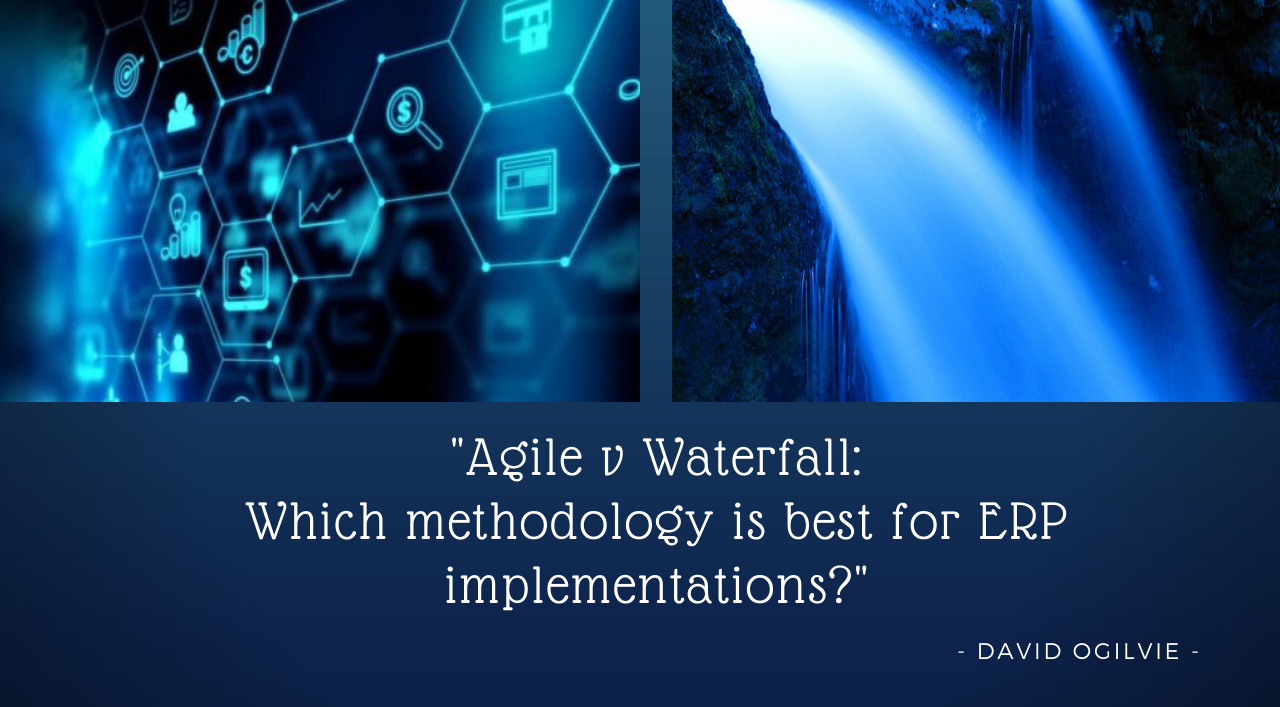
Agile v Waterfall
There has been significant debate in recent times around which implementation methodology is best to used for ERP implementations.
- What is it that I have seen in the industry of late:
- Huge push by software vendors to cloud offering.
- This drive is driven by the allure for software vendors whereby:
- Cash flow is improved via the regularity of subscriptions.
- The ability to tie a customer to your platform is easier now with a subscription than it was before whereby large capital investments were required.
Some vendors have jumped on the Agile bandwagon some have not. The reason why is difficult to determine in some cases other than it is the flavour of the month and it is the hip thing to do.
There is no agreement between advisors, whether independent of not, about which is better. So what do we know that will feed this debate?
- Following the herd is not the thing to do.
- Doing what has been done for the past 20 to 30 years with an >70% failure rate is probability not a good idea.
- That some in the industry have a dogma about their view, they lead with methodology rather than assessing what is in the client’s best interests.
There is no one right way to utilise Agile. It is not a methodology that can be turned into a cookie cutter approach and deployed the same way in different companies. It is best used when it is customised to what best suits the client’s company culture. Resulting in a large number of bastardised methods of deploying the tools.
Like many things that relate to ERP, my feeling is the answer is “It depends”.
My observations of Waterfall:
- Provides a full view of the tasks required to get to the end.
- Requires a significant effort to account for every possible situation prior to commencing.
- Can provide a reasonable estimate of timeframe, albeit a majority of waterfall projects go over time.
- Non-performers can hide in a project team using a waterfall approach. You often don’t know tasks are off track until the last minute, after having wasted significant periods of time.
- It requires to you make estimates on elements over which you have little, and often no, control a long way into the future. The one thing we know about forecasts is they are always wrong and the further into the future you try to forecast the more wrong they become.
- It is argued by some that waterfall has an advantage over agile because it helps align the organisation because it allows for cross functional teams’ requirements to be considered in the design. I disagree. There have been many misalignments in larger ERP implementations simply because the skill set of most software vendor consultants is siloed within the different modules. There is nothing magical in waterfall that makes them talk to each other to get aligned.
My observations of Agile:
- Breaks the project down into small workable chunks that are easier to manage.
- Highlights poor performers within your team nice and early – nowhere for them to hide.
- You can make course corrections early if things are not performing as expected.
- Provides a good communication mechanism so all work streams in a project are across what is happening within a project at any given moment.
- The concept of MVP provides a good structure and discipline for large project roll outs. It provides the ability to deploy smaller components that generate value quicker rather than having to wait until a whole large piece of work is completed.
- The concepts are often foreign to a client’s company and as such requires a seasoned leader in agile to run successfully. It has the ability to make some within a project team uncomfortable initially until they get used to how the system works and the cadence of delivery that is required.
- It provides a framework where continual successful delivery is paramount. There is (often) a substantial cultural shift required as many companies are not used to delivering so much so quickly.
- The fluidity nature of agile makes it difficult to budget. In some circles is seems as if an endless bucket of money is required until you finish. Sprints provide you with timeline certainty. What it doesn’t guarantee is what functionality will be delivered within each time box.
- I believe a well run agile team can actually foster better alignment when the sprint planning exercise and stand ups are well run. You open up the opportunity to get fast feedback from across the organisation on a daily basis. Something you don’t get with waterfall.
- Agile should never be used in a ERP context as a sampler. It is a deployment methodology not a selection methodology. If you don’t have a full enterprise solution mapped out that’s an issue deeper within the organisation and not something a deployment methodology can help with.
So if you are looking to replace your existing business system and need some guidance on what is best for your organisation, give me a call. My past clients say I have:
- Honest point of view;
- A proven methodology that can adapt to your circumstance;
- Knowledge of what questions to ask and an ability to put the vendor under pressure to prove their statements of capability;
- An ability to support to executives so their risk is minimised.
Until next month …
Sincerely,
David